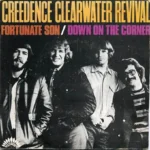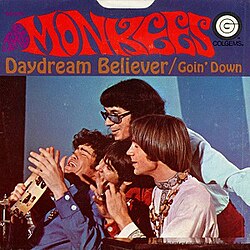 Creedence Clearwater Revival’s “Fortunate Son,” released in 1969 on their album Willy and the Poor Boys, is more than just a rock song — it is a cultural statement, a political commentary, and an anthem of dissent that has resonated for over half a century. With its driving guitar riffs, swampy Southern rock vibe, and John Fogerty’s unmistakable vocals, “Fortunate Son” stands as one of the most powerful protest songs of the Vietnam War era. It captures the frustrations of a generation grappling with class inequality, government hypocrisy, and the senselessness of war, yet its message remains relevant decades later. CCR distilled raw energy, social consciousness, and rock ‘n’ roll craftsmanship into a track that still feels urgent today.
Creedence Clearwater Revival’s “Fortunate Son,” released in 1969 on their album Willy and the Poor Boys, is more than just a rock song — it is a cultural statement, a political commentary, and an anthem of dissent that has resonated for over half a century. With its driving guitar riffs, swampy Southern rock vibe, and John Fogerty’s unmistakable vocals, “Fortunate Son” stands as one of the most powerful protest songs of the Vietnam War era. It captures the frustrations of a generation grappling with class inequality, government hypocrisy, and the senselessness of war, yet its message remains relevant decades later. CCR distilled raw energy, social consciousness, and rock ‘n’ roll craftsmanship into a track that still feels urgent today.
From the opening guitar riff, the song asserts itself with immediacy. The riff is simple but unmistakable: gritty, chugging, and propelled by Doug Clifford’s tight drumming and Stu Cook’s bass. It’s a riff that commands attention, serving as both a musical hook and a driving force behind the song’s relentless momentum. This sense of urgency mirrors the song’s lyrical content — an indictment of those who benefit from privilege while the average American fights and dies in a war they had little control over.
Lyrics as Social Commentary
“Fortunate Son” is most renowned for its incisive and direct lyrics. John Fogerty’s words cut sharply, critiquing social and political inequities with biting precision. Lines like “Some folks are born made to wave the flag / Ooh, they’re red, white and blue” immediately establish the song’s theme: the intersection of nationalism and class privilege. Fogerty contrasts the patriotic image of the elite with the reality faced by ordinary citizens, particularly young men drafted into military service during the Vietnam War.
The song’s chorus — “It ain’t me, it ain’t me, I ain’t no senator’s son” — is both declarative and defiant. It resonates as a statement of identity, separating those who reap advantages from birth from those subjected to the rigors and injustices of circumstance. The repetition of the line emphasizes the emotional weight of exclusion and frustration, making it a rallying cry for listeners who feel overlooked or exploited.
What makes the lyrics timeless is their universality. While “Fortunate Son” was born from a specific historical context, its critique of inherited privilege, systemic inequality, and political hypocrisy transcends the Vietnam War era. The song continues to resonate today, reminding listeners of the enduring tensions between the powerful and the ordinary.
Fogerty’s Vocal Delivery
John Fogerty’s vocal performance on “Fortunate Son” is as compelling as the lyrics themselves. His delivery is raw, urgent, and unapologetically passionate. From the snarling verses to the emphatic choruses, Fogerty’s voice carries both anger and determination. There’s a sense of immediacy in his tone, a feeling that he is not simply performing the song but testifying, demanding the listener’s attention.
The contrast between the quieter, almost conversational delivery of the verses and the explosive choruses amplifies the song’s emotional impact. It mirrors the tension between the ordinary individual’s quiet struggle and the loud, brazen privilege of the “fortunate sons” he critiques. Fogerty’s voice embodies both frustration and righteous indignation, giving the lyrics an authenticity that few protest songs achieve.
Instrumentation: The Backbone of Rebellion
Musically, “Fortunate Son” is a masterclass in concise, powerful rock arrangement. The guitar riff, as previously mentioned, is iconic in its simplicity. Played with grit and precision, it serves as a musical embodiment of the song’s rebellious spirit. Doug Clifford’s drumming drives the track forward with a sense of controlled urgency, while Stu Cook’s bass anchors the groove, creating a cohesive sonic foundation for Fogerty’s vocals.
The song’s instrumentation is intentionally direct, reflecting the song’s message. There are no extraneous flourishes, just straightforward rock ‘n’ roll energy — a sound that complements the lyrical critique. The minor-key elements in the riff and melody contribute to a feeling of tension and unease, perfectly underscoring the song’s themes of injustice and frustration.
The production by CCR is also noteworthy. Despite its rawness, the track is balanced, allowing each instrument to be distinct while maintaining the aggressive, driving force of the arrangement. The swampy, Southern rock tone — a CCR signature — gives the song a gritty authenticity, connecting it to real-world landscapes of working-class America.
Context and Historical Significance
“Fortunate Son” was released at a critical juncture in American history. The late 1960s were marked by the Vietnam War, civil unrest, and growing skepticism toward the government. Young men were being drafted into military service, often regardless of personal desire, while children of the wealthy and politically connected could find ways to avoid service. In this context, “Fortunate Son” became more than a song — it was an anthem for those feeling exploited and marginalized by the system.
The song’s critique of privilege was pointed and unflinching. Fogerty himself noted that it was inspired in part by the families of politicians and public figures who avoided the draft while ordinary Americans bore the brunt of wartime service. Its directness made it both controversial and relatable, cementing its place in the pantheon of protest music.
Beyond the Vietnam War, the song also resonated with listeners grappling with broader societal inequities. Its themes of class, privilege, and injustice transcended a single historical moment, allowing it to remain relevant through subsequent decades of social and political change.
Emotional Resonance and Listener Connection
“Fortunate Son” succeeds not only as a political statement but also as an emotionally compelling piece of music. The combination of lyrics, vocal delivery, and instrumentation creates a sense of shared frustration and righteous anger. Listeners are drawn into the narrative, feeling the tension, indignation, and determination that Fogerty conveys.
The song’s energy also inspires action, or at least empathy. Its driving rhythm and assertive vocal style make it impossible to remain passive while listening. Even today, it functions as both a historical artifact and a call to recognize and confront systemic inequities. Its enduring popularity lies in its ability to capture emotion — the feeling of being overlooked, exploited, or frustrated — and translate it into a universal musical experience.
Cultural Impact and Legacy
The legacy of “Fortunate Son” extends far beyond its original release. The song has been used extensively in film, television, and advertising, particularly in contexts that reference the Vietnam War or critique social inequality. Its instantly recognizable riff and lyrics make it a shorthand for rebellion, dissent, and critique of privilege.
Musically, it has influenced countless artists in rock, punk, and alternative genres. The directness of its arrangement, coupled with its lyrical clarity, became a model for protest and politically conscious music. The song demonstrates that rock ‘n’ roll can be both musically compelling and socially significant, bridging the gap between artistry and activism.
“Fortunate Son” is also a touchstone in American popular culture. Its opening riff is instantly identifiable, and the chorus has entered the lexicon of political commentary. Even listeners unfamiliar with CCR’s broader catalog recognize the song’s power and purpose, a testament to its enduring resonance and cultural importance.
Musical Craftsmanship
While “Fortunate Son” is celebrated for its social commentary, its musical craftsmanship is equally impressive. The song’s structure is taut and efficient, with each section contributing to the overall momentum. The verses build tension with tight, rhythmic strumming and subdued vocal delivery, while the choruses release that tension in an explosive, cathartic expression.
The guitar work, while straightforward, is nuanced. Subtle bends, minor chord voicings, and rhythmic accents give the riff character and emotional depth. Clifford’s drumming is precise, driving the song forward without overshadowing the melodic elements. Cook’s bass lines provide both harmonic support and rhythmic propulsion, rounding out the sound. Every element serves the song’s message, demonstrating the band’s mastery of economy and focus in rock songwriting.
Timelessness and Contemporary Relevance
Decades after its release, “Fortunate Son” remains a relevant anthem. Its critique of privilege, inequality, and political hypocrisy continues to resonate in modern contexts, whether discussing military service, socioeconomic disparities, or systemic corruption. The song’s enduring appeal lies in its clarity and directness: it doesn’t rely on nostalgia alone, but on fundamental truths about power, society, and fairness.
Its musical energy also keeps it fresh. The driving riff, explosive choruses, and swampy rock groove maintain their intensity regardless of era. When performed live or played on the radio, “Fortunate Son” retains its visceral impact, proving that its combination of message and musicianship transcends temporal boundaries.
Conclusion: A Rock Anthem for the Ages
Creedence Clearwater Revival’s “Fortunate Son” is a landmark achievement in rock music, combining political commentary, emotional intensity, and musical precision into a track that has stood the test of time. Its driving riffs, aggressive vocals, and raw production create an atmosphere of urgency and rebellion, perfectly complementing Fogerty’s incisive critique of privilege and inequality.
The song’s enduring power comes from its ability to resonate across generations. It is both a historical document and a living anthem, relevant in any context where social inequities and systemic advantage are at play. Its energy is palpable, its message clear, and its musical execution impeccable.
“Fortunate Son” is more than a song; it is a statement, a rallying cry, and a masterclass in how rock ‘n’ roll can combine artistry with activism. Decades later, it continues to command attention, inspire reflection, and stir the rebellious spirit in listeners around the world. CCR distilled frustration, outrage, and musical skill into a timeless anthem, creating a track that will remain a cornerstone of American rock and protest music for generations to come.


